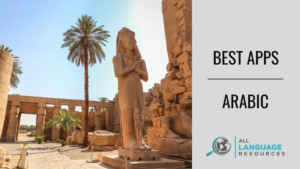With over 400 million speakers—both native and non-native—and counting, Arabic is one of the most spoken languages in the world. It is spoken in a variety of dialects across many countries and is also one of the six official languages of the UN. This means that learning Arabic can help you communicate almost anywhere!
There are many reasons to learn Arabic. Planning a trip to Dubai, Morocco, or Egypt, you have an interest in Arabic poetry, literature, calligraphy, or maybe you just like the Arabic language and culture. These are all valid reasons to start learning Arabic. Whether your reasons are personal or professional, having all the relevant resources and helpful information that you need before you start learning Arabic is important.
If you want to get straight to the point and read our reviews and recommendations for numerous language-learning resources, take a look at these posts:




 5 Best Practices to Learn Arabic Online
5 Best Practices to Learn Arabic Online
From its script to its structure, the Arabic language is very broad and diverse. For this reason, you need to understand the very basics of the language and what makes it so unique.
Although Arabic is considered to be one of the most difficult languages to learn as an English speaker, we’ll help make it easier for you to explore Arabic learning resources and curate your study plan to fit your learning needs, goals, and preferences.
Learn Arabic on your own with this self-study guide. Can you learn Arabic for free? Best dialect to learn? How long does it take to learn Arabic? Find out here. Let’s get started!
Table of Contents
Can You Learn Arabic On Your Own?
These days, apps and virtual conversation opportunities make it easy to learn Arabic on your own. You can master the basics of Arabic grammar using a tool as simple as a printed textbook or as advanced as an online course.
In fact, the tips listed in this article can help you create your own personalized Arabic learning program!
One thing to remember as you set out on this language-learning journey is that you want to make sure you cover all the key areas of the language. Don’t focus so hard on Arabic grammar that you forget to learn about customs and culture. Likewise, don’t get so engaged with Arabic movies and music that you forget to buckle down and study grammar.
This is the main reason a paid class or online course has an advantage for the serious language learner. It provides all the info you need in a logical order to make sure you cover all your bases.
Best Way to Learn Arabic
The best way to learn Arabic is to focus on one dialect, pinpoint your fluency goals, and choose learning tools that help you reach those goals. You can find a wealth of great resources to help you learn Arabic.
It’s true that English speakers often find Arabic a particularly challenging language to learn. This is because Arabic is super different from English. It uses a different grammatical structure, has its own alphabet and writing system, contains sounds that don’t exist in English, and even reads right to left instead of left to right.
But Arabic is also one of the most ancient and beautiful languages in the world. You simply need the right tools and tips to help you access this amazing language!
Choose a Dialect
The first crucial step in learning Arabic is to pick which version of Arabic you want to speak. Arabic developed quite differently around the world, meaning that the colloquial Arabic spoken in Egypt will sound and read differently from the Arabic spoken in Qatar or Syria.
On top of this, many Arabic textbooks and college classes actually teach a special version of Arabic that is not spoken anywhere. This is called classic Arabic or Modern Standard Arabic. This formal version of the Arabic language serves as the official language of 25 countries around the world. It is the language used in the Quran as well as in most official documents.
MSA is what you hear on TV from news anchors and in formal speeches. You also use this dialect for formal greetings, especially with strangers. (The very polite greeting salaam aleikum, or peace be upon you, uses MSA). But the MSA version of Arabic has a more complex grammar and much more archaic style than the dialects that people actually speak.
Some of the most popular spoken Arabic dialects include:
- Egyptian Arabic is the most commonly spoken Arabic dialect. The good news for you is that this dialect has simpler grammar than MSA, making it easier to learn! It also uses more vowel sounds than MSA and became famous globally partially because you see it used in Arabic movies and music due to the prolific Egyptian film industry.
- Gulf Arabic is sort of a catch-all term for the dialects spoken in Saudi Arabia, Qatar, and other nations in the Arabian Peninsula. This dialect shares the most similarities with MSA.
- Levantine Arabic is mostly spoken in Syria, Palestine, Jordan, and Lebanon, an area known as the Levant. This dialect uses a spoken grammar that differs a lot from MSA, and has an especially informal flow that makes it popular with young Arab speakers.
Focus on the Fundamentals First
No matter which dialect you choose to learn, you should begin by focusing on the fundamentals. Arabic has its own alphabet and written script, and learning this will help you gain true fluency much faster.
The Arabic alphabet contains 28 letters and only one vowel. At first, this can seem difficult to read, because you look at a word and see only consonants, leaving you wondering how to pronounce it!
Because of this challenge, some language learning programs bypass Arabic script and instead use Arabizi or Franco Arabic. Arabizi is basically Arabic words spelled out phonetically using the Roman alphabet.
This can help you learn how Arabic words sound and boost your vocabulary, but in the long term, it undercuts your ability to gain true fluency. You need literacy for everything from reading street signs to building a solid knowledge of Arabic grammar.
Set Specific Goals for Learning Arabic
To learn Arabic in the best way possible, you need to clarify your fluency goals upfront. Do you want to learn Arabic so that you can communicate with extended family living in Syria? Or do you want a marketable skill in the modern corporate or government workforce? Your goals can help you pick the right language-learning tools for you.
Obviously, understanding why you want to speak Arabic can help you pinpoint which Arabic dialect to learn. For example, if you want to apply to work for the government, you probably want to learn formal Modern Standard Arabic. If you plan to travel to the Middle East, you may want to learn Gulf Arabic.
But setting specific goals can also help you tailor your pool of core vocabulary to gain fluency faster. Language experts like these writers for the BBC know that most people only use about 20% of the words in their native language from day to day.
Once you decide if you want to learn Arabic for a business vs a travel or family setting, you can buckle down and learn that 20% of the language that will work best in that setting.
Plan Your Budget
While you don’t have to spend a lot to learn Arabic, it does help if you establish a budget before you begin. This way you know if you can afford an online course, a tutor, or a month living in your target destination for full immersion.
In fact, you may want to consider saving up a little before you dive into learning Arabic. This way you can set aside funds for subscribing to an app or driving to a community center for a local class. Plus, if you have a deadline for fluency, you may want to shell out a bit more to get the best resources and speed up your language-learning journey.
You don’t need to spend an arm and a leg to learn Arabic–and you can even find many excellent resources for free–but the fact is that many of the best language-learning resources do cost a little bit more. The trade-off is that a paid course or lessons from a private tutor come with a built-in structure and the guarantee that you will learn everything you need to achieve basic fluency in Arabic.
Match Your Learning Method to Your Lifestyle
Another important thing to consider as you choose what learning tools will help you learn Arabic is to match the tools to your lifestyle. If you have a long commute to work or feel like you are always on the go, you may want to pick an audio-based learning resource. This way you can listen and learn while you drive, walk, or bike!
Mix and Match Learning Arabic Tools
Another great way to approach learning Arabic is to mix and match the learning tools that work best for you to make sure you cover all the key areas of difficulty in Arabic.
For example, you need to make sure you gain a clear understanding of Arabic grammar, but you also want to find plenty of opportunities to practice pronunciation. Some Arabic language-learning tools tend to focus on one skill more than another.
Learning Arabic grammar proves challenging for many English speakers for multiple reasons, especially the verb forms in Arabic. Arabic uses different words to indicate whether a man or a woman performs the action in a sentence. This means you have to learn many different forms for one action word!
Pronouncing Arabic correctly also challenges most English speakers because Arabic contains sounds we don’t use in English, including a special kind of consonant called pharyngeal consonants that you form at the back of your throat.
The good news is that you can find excellent learning resources that target these specific Arabic challenges.
Find In-Person Arabic Learning Opportunities
Apps are great, but if you can afford an in-person class, you will get access to built-in conversation practice! If you can’t afford a class at a community college or local institution, consider hiring a private tutor.
As a word of warning, check into what dialect the class teaches before signing up, though. Many college courses teach MSA and focus heavily on formal grammar, which may not be what you want to learn in order to reach your fluency goals. (Or perhaps it is–this can give you a solid foundation in Arabic literacy that will serve you well later on in any Arabic dialect).
Immerse Yourself in the Arabic Language
You probably know that one of the best ways to gain fluency in any language is to immerse yourself in the language as completely as possible. But immersion doesn’t have to mean living in an Arabic-speaking country for a couple of months.
Immersion can mean finding your local Arabic community and visiting cultural centers, Halal grocery stores, or a mosque to meet people who speak Arabic. Almost 1.5 people speak Arabic in the United States alone!
Simply listening to the flow of real-life conversations in Arabic will strengthen your listening comprehension skills by leaps and bounds and help you grasp cultural norms much better than reading a textbook.
Besides in-person activities, you can surround yourself with the sound of Arabic in your home as well.
- Look for Arabic movies and TV shows through sites like Netflix or YouTube. Did you know that Egypt has produced over 2,500 feature films? The Arab Film and Media Institute provides a great resource to help you understand Arab cinema and gives you a great cultural resource as well.
- You can also find free Arabic lessons on YouTube, or watch the news in Arabic through this handy app. In some cases, you can find YouTube videos with subtitles in English as well.
- Listen to songs in Arabic through Spotify, or download interesting podcasts in Arabic once you reach a strong enough level of listening comprehension.
Take Your Time Learning Arabic
Remember the old story of the tortoise and the hare? In language study, you want to work like a slow and steady tortoise. This is not to say that you want to learn slowly, but rather that you want to keep going, every day, a bit at a time!
A mad dash like the hare in the story–such as an all-day cram session–just won’t work as well when you want to learn a complex language like Arabic.
One of the best ways to motivate yourself to learn Arabic is to set a deadline. This serves as the finish line of your language-learning race, to carry the tortoise and hare metaphor a bit farther.
You may already have a deadline. Maybe your family plans to go on hajj to Mecca next year. Or perhaps you want to apply for a government job that requires Arabic as a second language.
Set your deadline and then plan a consistent, structured approach to your study sessions. If you can, set aside one hour every day for focused study. The United States Foreign Services Institute, or FSI, estimates that it takes most English speakers 2,200 hours of focused study to learn Arabic.
If you study one hour a day, it will take you about 6 years to reach a basic level of fluency. On the other hand, if you sign up for a more intensive class, subscribe to a handful of good apps, and put in three hours a day, you can cut your timeline down to about two years.
Remember that Fluency is More Than Words
If you want to communicate fluently in Arabic, you need to understand that culture is just as important in communication as vocabulary, grammar, or other language components.
Imagine that you want to buy a snack from a vendor at a marketplace in Iraq or Egypt. You say hello to the vendor using exactly the polite greeting of salamu aleeku but then turn away impatiently when he begins to tell you a story about his day or local places of interest, while you simply want to eat your snack.
You probably know that this is a rude response within Arabic culture! Understanding the culture of the people and places you want to visit means so much more than simply knowing the right words to say in Arabic. It means understanding the expectations for manners, respect, and even gender roles in that community.
As another example, it is often considered rude to use the word “no” or make a firm refusal in Arabic culture. You can politely sidestep by saying inshallah, (as God wills it) or simply accept the request, especially if a friend asks you for something.
- Free resources like Khallina provide a window into Arabic culture as well. This website offers access to things like Iraqi poetry or an introduction to the Arabic tea culture.
- Qatar Foundation International provides access to a series of movies to help introduce you to Arabic culture.
Keep in mind that growing up in an English-speaking country like America may have given you a distorted view of Arabic culture. Think about the Arabic characters you have seen in American movies and TV shows, and then watch movies made in Egypt to see how differently the two sets of movies portray Arab people.
Ultimately, you want to assimilate yourself into Arabic culture in order to truly gain fluency and the ability to communicate with people in an Arabic-speaking community.
Easiest Way to Learn Arabic
The “easiest” way to learn Arabic varies from person to person, depending on factors such as prior language learning experience, preferred learning style, and individual goals.
However, some strategies can generally make the process smoother. Immersion, whether through language courses, apps, or cultural experiences, can accelerate learning by surrounding yourself with Arabic language and culture.
Additionally, breaking down the language into manageable chunks, focusing on practical vocabulary and grammar, can help prevent overwhelm. Consistent practice, even if just for a short time each day, is key to retention and progress. Leveraging resources like language learning apps, online courses, textbooks, and language exchange partners can provide structure and support.
Finally, maintaining a positive attitude and embracing mistakes as part of the learning process can foster resilience and motivation. Ultimately, finding the easiest way to learn Arabic involves experimenting with different methods to discover what works best for you.
What’s the Best Arabic Dialect to Learn?
The “best” dialect of Arabic to learn depends on your specific goals and interests. Modern Standard Arabic (MSA) serves as the formal written language across the Arabic-speaking world and is used in literature, media, education, and formal settings. Learning MSA provides a strong foundation for understanding classical Arabic texts and communicating with educated speakers across different Arabic-speaking countries.
However, if your aim is to communicate effectively in everyday situations or to engage with specific communities or regions, learning a spoken dialect may be more practical. Popular dialects such as Egyptian Arabic, Levantine Arabic (spoken in countries like Lebanon, Syria, Jordan, and Palestine), or Gulf Arabic (spoken in countries like Saudi Arabia, the UAE, and Qatar) are widely understood due to their prevalence in media and pop culture.
Ultimately, the best dialect for you to learn depends on your personal interests, goals, and the specific context in which you plan to use your Arabic language skills.
How Long Does it Take to Learn Arabic?
As you know from reading this article, it takes the average English speaker 2,200 hours of dedicated study or classroom time to learn Arabic at a basic level of fluency. However, your personal timeline for learning Arabic can vary based on a number of factors.
First, do you speak any other languages? If your brain already has the foundation of skills necessary to learn a new language, you will learn more quickly. This is especially true if you already know a language that shares similarities with Arabic, like Persian or Hebrew.
Second, can you afford to travel? If so, you can dive into immersion learning by traveling to an Arabic-speaking country. Necessity will force you to learn Arabic vocabulary by leaps and bounds, and you will get first-hand exposure to Arabic culture as well.
Finally, how much time per day can you devote to learning Arabic? You can get through those 2,200 hours pretty quickly if you have four or five hours a day to devote to intense study!
How to Speak Arabic
Arabic dialects can vary significantly depending on region and context, so it’s essential to expose yourself to authentic spoken Arabic through various means such as movies, TV shows, music, and online resources. Immersing yourself in the culture associated with each dialect can also deepen your understanding and proficiency.
Additionally, practicing speaking with native speakers or language exchange partners from different regions can help you refine your pronunciation, vocabulary, and comprehension skills specific to each dialect. By actively engaging with diverse Arabic dialects and consistently practicing speaking, listening, and conversing in different contexts, you can gradually become more proficient in understanding and speaking various Arabic dialects.
How to Read Arabic
Learning to read Arabic can be challenging but rewarding with the right strategies. First, familiarize yourself with the Arabic script, which consists of 28 letters and is written from right to left. Start by learning the basic shapes and sounds of each letter, as well as their different forms depending on their position in a word. Practice writing the letters by hand to improve muscle memory and recognition.
Next, focus on building vocabulary through reading simple texts such as children’s books, newspapers, or online articles. Break down unfamiliar words into their individual letters and sounds to decipher their meaning. Utilize resources like Arabic-English dictionaries or language learning apps to aid comprehension.
Additionally, consider working with a tutor or joining a study group to receive feedback and practice reading aloud. With consistent practice and perseverance, you can gradually improve your reading skills in Arabic.
Can You Learn Arabic Online for Free?
You can learn Arabic for free using resources like YouTube, or even work abroad to gain a wider cultural understanding of Arabic.
- Free video platforms like YouTube give you access to Arabic movies as well as to tons of content produced by Arabic speakers. For example, Omar Farooq’s channel “Omar Tries” has over 6 million subscribers and chronicles fun experiments and adventures Omar embarks on.
- Want to travel but don’t have the budget? You may want to consider a work exchange program in an Arabic-speaking part of the world. Worldpackers offers an introduction to what this kind of program looks like.

